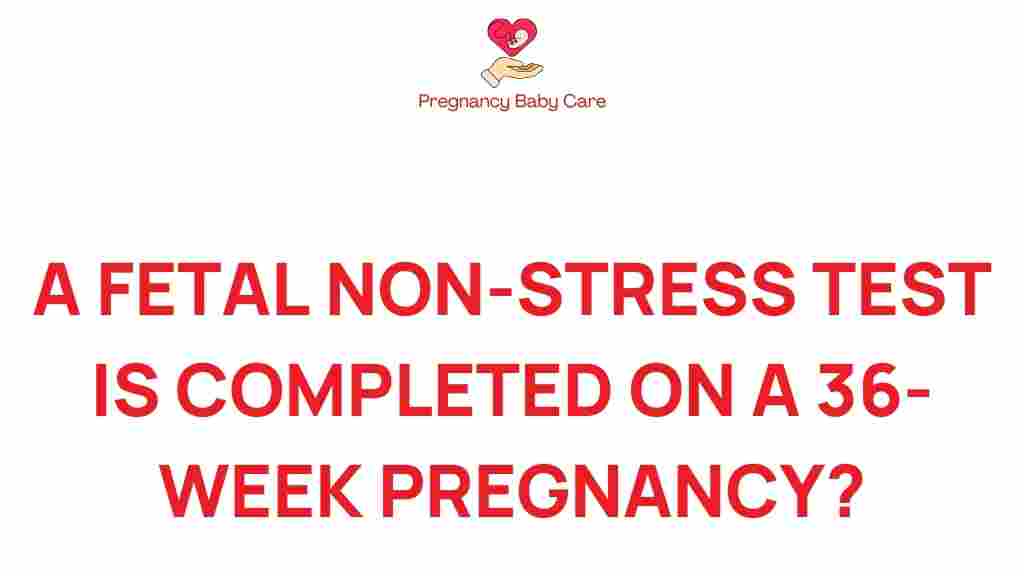Understanding the Fetal Non-Stress Test at 36 Weeks
As you approach the final weeks of your 36-week pregnancy, it’s normal to have questions about the various assessments that are part of your prenatal care. One of the key evaluations you may encounter is the fetal non-stress test (NST). This test is designed to monitor your baby’s well-being and assess their health as you prepare for delivery. In this article, we will dive deep into what a fetal non-stress test entails, why it is performed, and what you can expect during the process.
What is a Fetal Non-Stress Test?
The fetal non-stress test is a simple, non-invasive procedure used to monitor a baby’s heart rate and movements. It provides critical information about fetal health and is an important part of fetal monitoring during the later stages of pregnancy, especially at 36 weeks and beyond.
Why is the Fetal Non-Stress Test Important?
As part of obstetric assessments, the NST helps to ensure the following:
- Baby’s Well-Being: The test helps determine if the baby is getting enough oxygen and is under no distress.
- Maternal Health: It assesses the overall health status of the mother and baby.
- Fetal Movement: Increased fetal movement is generally a good sign of health, while reduced movement may warrant further investigation.
When is the Fetal Non-Stress Test Performed?
The NST is commonly performed during the third trimester of pregnancy, particularly around 36 weeks or later, especially if there are concerns regarding the baby’s health or if the mother has certain medical conditions.
How is the Fetal Non-Stress Test Conducted?
Understanding the process of the fetal non-stress test can help alleviate any anxiety you may have. Here’s what you can expect:
1. Preparation
Before the test, you will be asked to lie down in a comfortable position, usually on your side. This position helps improve blood flow to the baby.
2. Placement of Sensors
Two sensors will be placed on your abdomen:
- Heart Rate Monitor: This monitors your baby’s heart rate.
- Contraction Monitor: This measures uterine contractions.
3. Monitoring Period
The test usually lasts about 20 to 40 minutes. During this time, you may be asked to press a button every time you feel your baby move. This helps correlate movements with changes in the heart rate.
4. Results Interpretation
The results of the NST are typically available immediately. A reactive result is indicated by two or more accelerations of the fetal heart rate in a 20-minute period, showing that the baby is healthy and responding well.
What Do the Results Mean?
The results of a fetal non-stress test can be categorized as:
- Reactive: This indicates that the baby’s heart rate increases appropriately with movements, suggesting good health.
- Non-Reactive: If there are fewer than two accelerations in a 20-minute period, further testing may be required, such as a biophysical profile or contraction stress test.
Potential Concerns and Troubleshooting Tips
While the NST is generally safe and straightforward, there are a few potential concerns and troubleshooting tips to consider:
1. Non-Reactive Results
If your test results are non-reactive, don’t panic. This does not necessarily mean that something is wrong with your baby. Your healthcare provider may suggest:
- Performing the test again after a period of time.
- Conducting additional assessments such as an ultrasound to monitor the baby’s condition.
2. Discomfort During the Test
Some women may experience discomfort while lying down or from the pressure of the sensors. If this occurs, communicate with your healthcare provider, who can adjust the sensors or provide additional support.
3. Baby’s Activity Level
If you notice a decrease in your baby’s movements leading up to the test, mention this to your healthcare provider. They may want to perform the NST sooner or conduct additional evaluations.
Conclusion
The fetal non-stress test at 36 weeks is a vital tool in ensuring both your and your baby’s health as you approach delivery. By understanding the procedure, its importance, and what to expect, you can feel more prepared and confident during this crucial time in your prenatal care. Remember, regular fetal monitoring is key to maintaining both maternal health and ensuring your baby’s well-being.
If you have any further questions about the NST or other aspects of your pregnancy, don’t hesitate to reach out to your healthcare provider for more information. For more on prenatal care and fetal monitoring, you can visit this website for additional resources.
For personal experiences and support, consider joining a community of expectant mothers where you can share and learn from each other. You can find such communities online, including forums and social media groups.
This article is in the category Pregnancy and created by PregnancyBabyCare Team
